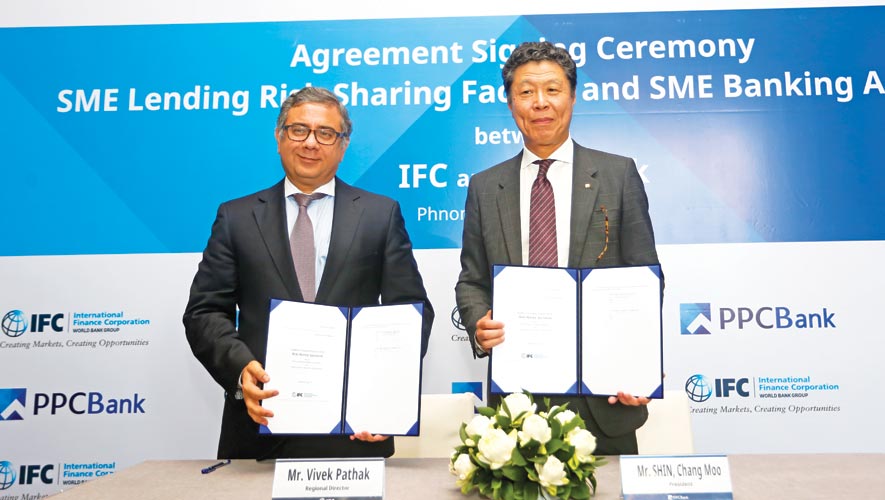The various initiatives launched to improve financial literacy among Cambodians have yet to show the desired results as significant challenges remain.
For the latest Cambodian Business news, visit Khmer Times Business
Chea Serey, director-general of the National Bank of Cambodia (NBC) identified the challenges that hinder the spread of financial literacy in the Kingdom.
Cambodia has been suffering from low level financial literacy that has become a significant obstacle to economic growth. A big chunk of Cambodia’s adult and young population is considered financially illiterate. The Kingdom is host to more than 16 million people.
Cambodia was ranked 135th out of more than 140 countries in the 2015 Global Financial Literacy survey conducted by Standard & Poor’s Ratings Services. The survey is described as the most comprehensive measurement of financial literacy worldwide. In that survey, only 18 percent of Cambodia’s adult population was considered financially literate. Cambodia ranked just slightly ahead of war-torn Somalia, which is one of the poorest countries on earth.
Cambodia also fared badly in a financial literacy survey commissioned by Asian Development Bank Institute in 2017 where it recorded a total score of 11.5 out of a possible 21, putting it near the bottom of 30 countries in the survey.
At NBC’s Financial Literacy Day, Serey says technology appears to be a challenge in itself for many Cambodians. But this challenge is not unique to Cambodia. The complexity of modern technology has hampered financial literacy programs in many other countries. “Technology is good but the challenge is to make people use it,” she says on Tuesday.
Lately, the Kingdom has seen a proliferation of mobile applications for banking, online purchase, and other financial transactions. The key to overcoming the problem is to encourage institutions to teach people how to use these mobile applications.
In addition, Serey also notes the mistaken impression about debt. “It’s not bad to request loans, as many people think,” she says. Negative thinking about loans and debt often results in people having no knowledge about requesting loans, property title or keeping proper records of their business.
Another hindrance is the location of a community. “At times, there is a lack of access to financial services due to the remoteness of a community,” she points out.
Critical to economic growth
Serey and other government and private officials present at the event were in agreement on the importance of financial literacy, especially to the Kingdom’s economy.
A country’s economic success is often tied to the level of financial literacy among the local population. According to her, countries with high level of financial literacy are often the ones that are most successful economically.
Western countries like Norway, which ranked near the top in financial literacy worldwide, are known for having some of the best economies in the world.
Likewise, Neav Chanthana, NBC deputy governor, says that improving financial literacy can boost national economic growth, aid the development of the financial sector, and increase people’s income.
The statement also found support from Bun Yin, chief executive officer of CIMB Bank Plc, who spoke on behalf of the Association of Banks in Cambodia (ABC). He says financial literacy is very important to the development of banks, which “play a crucial role in economic growth”.
Initiatives aplenty
Although the lack of initiatives has been a challenge for some countries, it is not in the case of Cambodia. In the last few years, public and private sectors have launched independently or in partnerships various initiatives to improve financial literacy in Cambodia.
This week, Maybank (Cambodia) Plc together with NBC and Education, Youth & Sports Ministry (MOEYS) launched Cashville Kidz Financial Literacy Programme 2019, a follow-up to its successful program first introduced in 2016.
Maybank chief executive officer Mohd Hanif Suadi says the bank is glad to continue helping in the improvement of financial literacy in the Kingdom.
“As we continue playing a role in contributing to the Cambodian economy, Cashville Kidz is a great platform for us to give back to the communities where we operate. The programme running strong in its third year continues to create a positive impact among children as we build a generation of young people who are equipped with adequate financial knowledge that would be beneficial to them in the future,” he adds.
Last year, NBC and Visa launched a new digital application called “NBC-Edu”, whose stated goal was help young people, who otherwise could easily fall into indebtedness or become victims of fraud due to lack of awareness.
NBC also partnered with MOEYS to develop a new school curriculum that will teach students about loans, savings, and other matters related to finances.
In addition, Cambodia Microfinance Association (MFA) introduced its own initiatives that have benefited thousands of Cambodians including schoolgoing children.
Welcome move
The concerted effort by the government and private sector to improve financial literary drew praise from some attendees of the event.
Sou Reaksmey, who came to the event with four of his classmates from the Centre for Banking Studies (CBS), says the focus on financial literacy is a good policy.
He notes that the level of knowledge among the public about financial services and products is still low. “There is a lack of knowledge, particularly with mobile apps used for financial transactions,” says Reaksmey, who is majoring in banking and finance.




